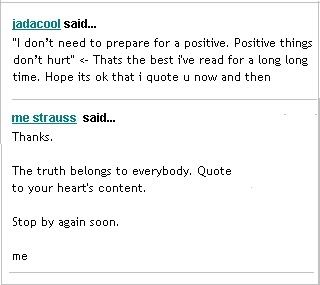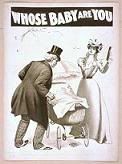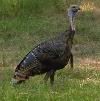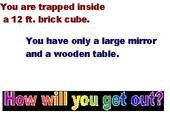
Okay so it’s not the Paparazzi—they’re not so hot anyway.
Go read
GoneAway’s fabulous post 171, in which he replays comments of past discussions. The reading is compelling and entertaining. Even more what a tribute it is to the insights that sit under each post. Now, granted Gone’s posts and discussions are legendary, but we’ve had a few glittering conversations of our own.
Letting me be . . . is happy to add our version to
Garnet's 90 great comments.
I hoped when I made a blog where people could let themselves be that they might actually do that. Proof of the pudding came today in a comment from Blogzilla on my post called
The Flower. She quotes me and then turns the thought right back to me. . . . I have to listen when smart people talk.
said...
"The flower spends no time thinking about being a flower."
Who presumes what a flower thinks about, or does not think about?
Perhaps one of the many beauties of a flower is that, if it dares to speak of what humans may be thinking, we cannot hear it.
The other comments I want to feature are the conversation on Social Conformity, a post about the
Asch test of how groups react to the conflict of having choose between an obvious right answer or the answer that the group has said is correct. So many people had so many great things to say, take a look.
Mark Cross said...
As I mentioned in a comment on my site today. We learn this behavior in grade school and carry it into our adult lives. I call it pack mentality but social conformity works too.
ME Strauss said...
I think we grown-ups have it worse than the kids.
Mark Cross said...
Very much so. You see it all around you. At work, in social gathers, inter-personal relationships and natural disasters.
garnet said...
People must think there's some trick, a double meaning to the test, or the question.Yes, pack mentality snags us daily. I am pretty contrarian in my choices: almost no TV, few magazines, less consumerist, less agressive about goals, into the present. But I often feel palpable social exclusion by the majority. As I mature, and through blogging, I've started to find others who orbit as far out as me.
said...
ME Strauss said...
Garnet,It's good to realize as we get older that the universe has many who aren't like the rest--sort of a minority majority. :) I've found that people who write tend to be that way by nature.
Jennifer said...
When I was younger, I would have rather died than stand out from the group. Now that I am older, I find myself wanting to be unique and different from everyone else.Yet if a group chose an obviously wrong answer, I would start to doubt myself. I would think the group saw something I was missing. I think it boils down to self-confidence more than conformity. But being only one person, I am not a representative sample of the population.
Lee Carlon said...
It is interesting, and I think it would be people with a little more confidence in themselves that give the answer they believe is correct. I'm fairly used to going a different way to most people, not so much because I want to stand out, but because I know what I want/think and rarely change that just to conform with other people.Good post Liz.
Ned said...
I am used to never having the same answer or opinion as anyone, let alone the group. I fear it may just be the fact that I am contrary rather than any individualism that I am exhibiting... sigh.It does seem to hold true that people are more comfortable with their opinions if others will agree and support them. It is part of human nature to want to be an individual, but not part of our nature to want to feel isolated.I suppose it is all a delicate dance between a need to be different and a need to be accepted.
rhein said...
"the way the mind works..."didn't someone say there is 3 frontiers left to humanity- the depths of the sea, the depths of space, and the depths of the human mind?
ME Strauss said...
Rhein,You are right about those three frontiers. Though with some of us, I suspect we might qualify for individual numbers on own. You know, frontier numbers 4, 5, 6, etc.
melly said...
When I was a teenager and a youth group guide I used to start my session on Nazi Germany with this same test. I'd ask one of the kids to leave, explain the test to the group, and then call the kid back inside the room. I did that because one of the most prevalent questions when talking to kids about what happened back then is - but how come no one said anything or stood up?Every once in a while a kid surprised me and stood his/her ground. You could never tell who these non-conforming kids would be in advance. Sometimes the popular ones, sometimes the nerdy/smart ones, and sometimes the annoying ones.It remained a mystery.
And finally
The 65th Crayon ends with this comment:
You are all gliterriing, nonconformist commerati. I'm proud to be a crayon in this community. You're all out of the box, and I'm proud to know ya. If the world can keep
letting us be, then I'm sure we'll all keep on commenting about it.
It seems wrong to keep great insights like these undercover.
. . . I'm thinking of featuring great comments once a week on this blog.
—me strauss Letting me be
 And gently comes the rain
And gently comes the rain





























